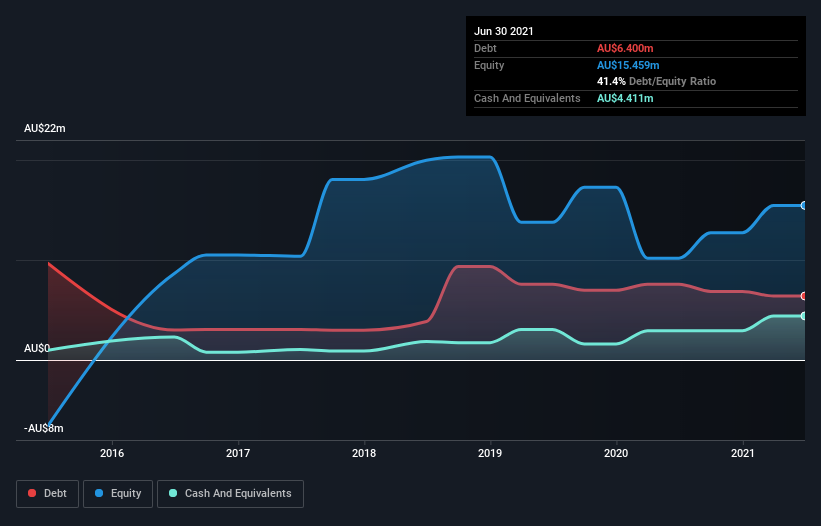
Warren Buffett famously said, 'Volatility is far from synonymous with risk.' So it might be obvious that you need to consider debt, when you think about how risky any given stock is, because too much debt can sink a company. We note that The Food Revolution Group Limited (ASX:FOD) does have debt on its balance sheet. But the more important question is: how much risk is that debt creating?
When Is Debt A Problem?
Debt is a tool to help businesses grow, but if a business is incapable of paying off its lenders, then it exists at their mercy. In the worst case scenario, a company can go bankrupt if it cannot pay its creditors. However, a more usual (but still expensive) situation is where a company must dilute shareholders at a cheap share price simply to get debt under control. Of course, plenty of companies use debt to fund growth, without any negative consequences. When we think about a company's use of debt, we first look at cash and debt together.
View our latest analysis for Food Revolution Group
How Much Debt Does Food Revolution Group Carry?
The image below, which you can click on for greater detail, shows that Food Revolution Group had debt of AU$6.40m at the end of June 2021, a reduction from AU$7.58m over a year. However, it also had AU$4.41m in cash, and so its net debt is AU$1.99m.

How Strong Is Food Revolution Group's Balance Sheet?
According to the last reported balance sheet, Food Revolution Group had liabilities of AU$13.4m due within 12 months, and liabilities of AU$10.8m due beyond 12 months. On the other hand, it had cash of AU$4.41m and AU$1.38m worth of receivables due within a year. So it has liabilities totalling AU$18.3m more than its cash and near-term receivables, combined.
This deficit is considerable relative to its market capitalization of AU$25.6m, so it does suggest shareholders should keep an eye on Food Revolution Group's use of debt. This suggests shareholders would be heavily diluted if the company needed to shore up its balance sheet in a hurry. The balance sheet is clearly the area to focus on when you are analysing debt. But it is Food Revolution Group's earnings that will influence how the balance sheet holds up in the future. So if you're keen to discover more about its earnings, it might be worth checking out this graph of its long term earnings trend.
Over 12 months, Food Revolution Group made a loss at the EBIT level, and saw its revenue drop to AU$34m, which is a fall of 2.3%. We would much prefer see growth.
Caveat Emptor
Over the last twelve months Food Revolution Group produced an earnings before interest and tax (EBIT) loss. Indeed, it lost AU$1.6m at the EBIT level. Considering that alongside the liabilities mentioned above does not give us much confidence that company should be using so much debt. Quite frankly we think the balance sheet is far from match-fit, although it could be improved with time. However, it doesn't help that it burned through AU$3.4m of cash over the last year. So suffice it to say we consider the stock very risky. When analysing debt levels, the balance sheet is the obvious place to start. However, not all investment risk resides within the balance sheet - far from it. We've identified 4 warning signs with Food Revolution Group (at least 2 which are potentially serious) , and understanding them should be part of your investment process.
Of course, if you're the type of investor who prefers buying stocks without the burden of debt, then don't hesitate to discover our exclusive list of net cash growth stocks, today.
If you decide to trade Food Revolution Group, use the lowest-cost* platform that is rated #1 Overall by Barron’s, Interactive Brokers. Trade stocks, options, futures, forex, bonds and funds on 135 markets, all from a single integrated account. Promoted
New: Manage All Your Stock Portfolios in One Place
We've created the ultimate portfolio companion for stock investors, and it's free.
• Connect an unlimited number of Portfolios and see your total in one currency
• Be alerted to new Warning Signs or Risks via email or mobile
• Track the Fair Value of your stocks
This article by Simply Wall St is general in nature. We provide commentary based on historical data and analyst forecasts only using an unbiased methodology and our articles are not intended to be financial advice. It does not constitute a recommendation to buy or sell any stock, and does not take account of your objectives, or your financial situation. We aim to bring you long-term focused analysis driven by fundamental data. Note that our analysis may not factor in the latest price-sensitive company announcements or qualitative material. Simply Wall St has no position in any stocks mentioned.
*Interactive Brokers Rated Lowest Cost Broker by StockBrokers.com Annual Online Review 2020
Have feedback on this article? Concerned about the content? Get in touch with us directly. Alternatively, email editorial-team (at) simplywallst.com.
About ASX:SPG
SPC Global Holdings
Operates as a beverage and wellness supplement company in Australia and Asia.
High growth potential and fair value.
Market Insights
Community Narratives




